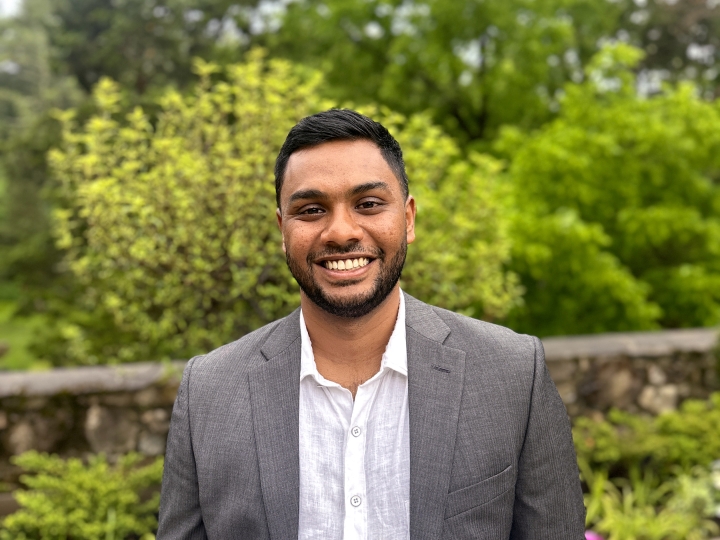
Laura Cook ’10, M’11, Chemical Engineering
January 29, 2021
Laura Cook is working at "warp speed" to help meet a global demand for more than 1 billion vaccine vials and accelerate COVID-19 vaccine deployment. Photo by Donald D. Constance
"Corning is proud to do its part in combating COVID-19. Knowing that my contribution is helping drive toward that common goal gives me a great sense of pride and purpose."
In the relay race for the cure for COVID-19, vaccine development is just the first leg. Those vaccines still need to be manufactured in astronomical quantities, packaged for delivery and injected into arms around the world before crossing the finish line of global immunity.
Laura Cook '10, M'11, a chemical engineering major and materials engineer for glass manufacturer Corning Incorporated, now holds a baton in the relay. As Corning ramps up its production of vaccine vials, Cook is working to not only help meet a worldwide demand for more than 1 billion vials, but to also identify ways to accelerate critical stages of the race, including vial manufacturing and the filling of vials with vaccines.
Cook helped develop a process for coating the exterior surface of Corning's Valor Glass vials that smooths the motion of the containers as they're rushed down the production line to be filled, sealed and packaged. Spread across hundreds of millions of vials, the microseconds saved each time vials touch add up, meaning production lines can run at higher speeds, potentially increasing the available manufacturing capacity for one of the world's most in-demand resources.
Cook says she and her team were working at "warp speed" on the project even before Corning entered into an agreement with the U.S. government to increase Corning's vial manufacturing capacity in summer 2020.
"There's significant pre-work that goes into meeting this type of capacity demand," Cook says. "The work started in early 2020, but sharply accelerated to keep pace with the progress of the vaccine manufacturers."
While she's done some of that work remotely due to the pandemic, Cook still relishes every opportunity to step into Corning's high-tech headquarters about 90 minutes north of Bucknell, just across the New York border. Surrounded by superheated crucibles and advanced robotic arms, she hunts for tweaks and innovations to make the machines even faster and more precise.
"We are very typically out on the floor," she says, "whether it's debugging an issue or thinking, 'What are we going to do next?' 'How do we improve upon our product and make it even better?' What most people don't realize is that innovation happens out on the line."
Skills Built at Bucknell
That kind of close-up, hands-on work is a perfect fit for Cook, who was inspired to study materials science by her natural curiosity about the inner workings of the material world. Fundamental questions like, "What is glass exactly?" drive her to keep investigating, experimenting and peering deeper every day.
While at Bucknell, Cook transformed that curiosity into the skills that she's using to help combat COVID-19 by taking on another of the world's most pressing challenges: climate change. Together with Professor Tim Raymond, chemical engineering, she used the high-tech atmospheric research equipment in the Dana Engineering Building to generate particles and observe their interaction with environmental factors like humidity. It was a process she'd repeat and draw upon in her first job with Corning, developing fiber-optic glass technologies at a lab in North Carolina.
"At Bucknell, I learned the fundamentals of how to generate particles, how to characterize them, and measure factors like their size in microns and how well they absorb or reflect light," she says. "When I joined Corning, we were trying to generate very specific particles, and we started our own characterization lab dedicated to this effort."
Her Bucknell research and experience also led directly to her job at Corning. Cook, who earned her bachelor's and master's through the College of Engineering's five-year program, presented her work at a research poster session during Bucknell's Homecoming in her final year. There, she connected with mechanical engineering alumnus Dan Hawtof '88, M'89, a career-long researcher and now a fellow at Corning.
"He took my resume and quickly shared it with Corning colleagues," she says. "It's because of his enthusiasm and appreciation for my background and experience that I received invitations to interview."
Today, Cook works to open similar doors for current Bucknell students. She mentors engineering majors through a pilot program in the College of Engineering and has invited students for "externship" job-shadowing experiences. She also serves on the college's Engineering Alumni Association Board, where she helps create even more opportunities for undergraduate design and research projects drawn from real-world problems facing industries, organizations and governments — experiences that often lead directly to job offers.
"Working directly with students helps us gauge who they are in a very real way. It's rewarding to be in a position where I can introduce them to Corning and help facilitate the development of a two-way relationship," she says. "It's much more effective than scanning a resume, which can tend to feel like we're evaluating words on paper rather than the person."
